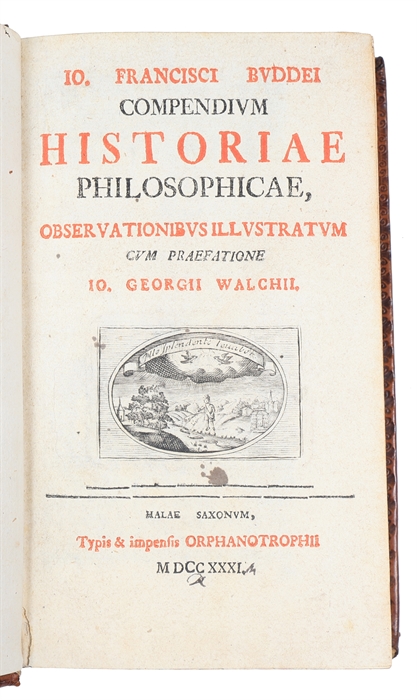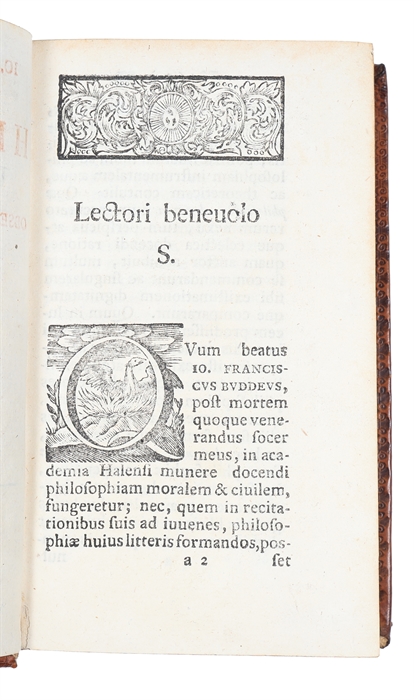ONE OF THE EARLIEST HISTORIES OF PHILOSOPHY TO APPEAR IN GERMANY
BUDDEUS, JOHANN FRANZ.
Compendium historiae philosophicae, observationibus illustratum.
Halae Saxonum, Orphanotrophii, 1731.
8vo. In a nice contemporary Cambridge-style mirror binding with four raised bands and richly gilt spine. Small paper-label pasted on to top of spine. Leather on boards cracked, with a few holes in the leather, making the wooden boards underneath visible. Internally very nice and clean. (16), 542, (46) pp.
First edition of one of the earliest histories of philosophy to appear in Germany, "Buddeus (1731: p. 25) begins his history with “the philosophy of the Hebrews”, identifying Adam as its ultimate progenitor, “for although he lost a large part of human wisdom [in the fall], it is very probable that he retained some fragments and remnants of it”. After Adam, Buddeus discusses the wisdom of later patriarchs such as Noah, Jacob, and Moses, eventually culminating in the teachings of the Cabbala. The second stage of philosophy’s history begins with “the philosophy of the gentiles, especially the barbarians” (Buddeus, 1731: p. 37), under which he groups the ancient Chaldeans, Persians, Phoenicians, Sabeans, Indians, Muslims, and Africans. About the last, Buddeus (1731: p. 64) writes: “In Africa, besides the Egyptians, the Libyans, and the Ethiopians, they are said to have been unacquainted with philosophy. But there are a few obscure and uncertain things that have become known to us about it” (these “obscure and uncertain things” turn out to be merely ancient reports of gymnosophists and astronomical learning in Ethiopia). The third stage of philosophy’s history is Greek philosophy, followed by medieval philosophy (in which Buddeus mentions a number of Islamic philosophers, but says little about their teachings). The final stage is “more recent philosophy” (Buddeus, 1731: p. 363), which curiously ends not with any European philosopher but with an ancient Chinese one: Confucius. Buddeus appears to have included Confucius because of the great interest in him in Europe that followed the publication in 1687 of Confucius Sinarum philosophus, sive scientia Sinensis latine exposita [Confucius, philosopher of China, or Chinese knowledge expounded in Latin] (Intorcetta, Herdtrick, de Rougemont, & Couplet, 1687)." (Wang, Racism and Eurocentrism in Histories of Philosophy).
Johann Franz Buddeus (1667-1729), born in Pomerania, was professor of Greek and Latin, moral philosophy and theology at Leipzig and Halle.
Order-nr.: 61449



